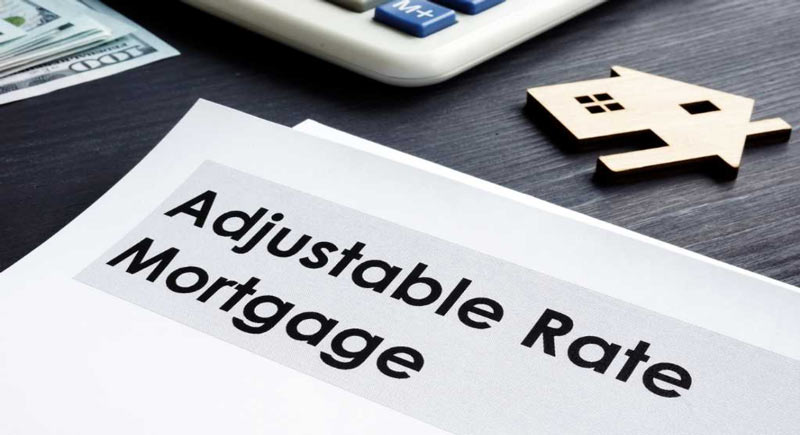Are you searching for an effective way to purchase a home? Are you looking for a flexible mortgage solution to save money over time? An adjustable-rate mortgage (ARM) might be the perfect fit. This type of loan gives borrowers more control over their mortgages, as it offers different loan terms than traditional fixed-rate loans do.
In this blog post, we'll cover everything you need to know about ARMs to choose your next home loan. We will discuss why adjustable-rate mortgages are popular amongst homebuyers, how they work, what potential benefits come along with them, and lastly, how to apply if one seems like the right option for you. Let's get into it!
Understanding Adjustable-Rate Mortgages (ARMs)
An adjustable-rate mortgage (ARM) is a financing product with a variable interest rate. ARMs provide borrowers with additional flexibility by enabling them to alter their interest rates for a duration that suits their budget and lifestyle, in contrast to typical fixed-rate mortgages, which have a single, constant interest rate for the duration of the loan.
ARMs are popular amongst homebuyers for a few reasons. First, they can provide more affordable payments in the short term since the interest rate is usually lower when compared to fixed-rate loans. This can make it easier for borrowers to get into their dream homes without stretching their finances too thin. Secondly, ARMs offer additional flexibility since borrowers can adjust the interest rate during their loan. This allows them to take advantage of lower rates as they become available, potentially reducing their overall loan costs.
Overall, an adjustable-rate mortgage is a great option for borrowers looking for more control over their mortgage payments and wanting to save money in the long run. If this loan suits your financial needs, you can start the application process by talking to a lender or mortgage broker specializing in ARMs. They will be able to provide you with more information about how this type of loan works and help determine if it’s right for you.
How can Adjustable-Rate Mortgages work better?
An adjustable-rate mortgage (ARM) works differently than a traditional fixed-rate loan. With an ARM, the interest rate you pay is adjusted periodically according to changes in the market. The interest rate adjustment period can range from 3 months to 10 years, depending on your ARM type.
At the beginning of your loan term, you will have a fixed interest rate for a set period. This initial rate is usually lower than what you would pay with a fixed-rate mortgage and can help make home-buying more affordable in the short term. After the initial rate period expires, your ARM’s interest rate can fluctuate according to market fluctuations. Your monthly payments could increase or decrease depending on the current rate environment.
Most ARMs limit how high or low the interest rate can go, known as “caps.” These caps help protect borrowers from huge spikes in their mortgage payments and give them peace of mind knowing that their payment won’t exceed a certain amount.
Types of ARMs
There are a variety of adjustable-rate mortgages available to homebuyers. Each type offers different features and benefits, so picking the one that best fits your needs is important. Here are 9 of the most popular types of ARMs:
Hybrid ARM
A Hybrid ARM is a combination of a fixed-rate and adjustable-rate mortgage. It begins with an initial fixed-rate period, after which the interest rate adjusts according to changes in the market.
Interest Only ARMs
An Interest Only ARM allows borrowers to pay just the interest on their loan for a certain period. After the interest-only period ends, borrowers must begin paying the principal and interest together.
Option ARM
An Option ARM is an adjustable-rate mortgage that gives borrowers four payment options each month: a deferred payment option, an interest-only option, a 15-year fixed rate option, and a 30-year fixed rate option.
5/1 ARM
A 5/1 ARM is an adjustable-rate mortgage with a fixed interest rate for the first five years of the loan term, after which the rate adjusts annually according to changes in the market.
10/1 ARM
A 10/1 ARM is an adjustable-rate mortgage with a fixed interest rate for the first ten years of the loan term, after which the rate adjusts annually according to changes in the market.
7/1 ARM
A 7/1 ARM is an adjustable-rate mortgage with a fixed interest rate for the first seven years of the loan term, after which the rate adjusts annually according to changes in the market.
3/1 ARM
A 3/1 ARM is an adjustable-rate mortgage with a fixed interest rate for the first three years of the loan term, after which the rate adjusts annually according to changes in the market.
How To Apply For An Adjustable-Rate Mortgage
Applying for an adjustable-rate mortgage is similar to applying for a traditional fixed-rate loan. You’ll need to provide all the same information as you would with a fixed-rate mortgage, including your credit history, income, and assets. Additionally, you may need to purchase private mortgage insurance (PMI) if you don’t have enough equity in the property.
Once you’ve gathered your documentation, you can shop for a lender or mortgage broker offering adjustable-rate mortgages. You’ll want to compare several lenders and get quotes from each to find the best deal.
It’s also important to read the terms and conditions of any ARM you’re considering. Ensure you understand how your interest rate will adjust, what caps are in place, and whether any fees are associated.
FAQs
What is the difference between a fixed-rate and an adjustable-rate mortgage?
An adjustable-rate mortgage (ARM) has an interest rate that can be changed in response to changes in the market, whereas a fixed-rate the mortgage has an interest rate that remains constant during the loan.
What are the requirements for an adjustable-rate mortgage?
You must meet the same requirements as a traditional fixed-rate loan to qualify for an adjustable-rate mortgage. You’ll need to present your credit history, income, and asset documentation to lenders or mortgage brokers to be considered. Additionally, you may be required to purchase private mortgage insurance (PMI) if you don’t have enough equity in the property.
Should I choose an adjustable-rate mortgage?
Whether or not an adjustable-rate mortgage is a good fit for you depends on your circumstances and goals. An ARM might be a great option if you want to save money in the short term, as the initial rate is typically lower than that of a fixed-rate loan. However, you should be aware that the rate could increase over time, so it’s important to keep this in mind when deciding whether or not an ARM is right for you. Speaking with a qualified financial professional before making decisions is also wise.
Conclusion
An adjustable-rate mortgage (ARM) can be a great solution for those looking to save money on their home loan. ARMs offer more control and flexibility than traditional fixed-rate loans and the potential for lower monthly payments. It’s important to understand all the different types of ARMs available, how they work, and what requirements are necessary to qualify, as well as to weigh the possible pros and cons before making a decision. Whether an ARM is right depends on your financial goals and objectives.

How to Back Out of Your Mortgage the Right Way

How to Increase Your Current Line of Credit

Robinhood Business Model- How do they make money?

What is a W-9 Form and Why You Need To Fill It Out

How to Save Money on Medical Bills?

Using Option Trading Strategies

Tax Efficiency: What is it and How to Calculate Tax Efficiency?

How To Increase Your Mortgage Preapproval Amount

Exploring the Best Insurance for Jet Ski: Pros and Cons of Top Providers

Local Tax: What is Impact of Local Taxation?

Credit Card Default: How It Happens, What To Do About It


